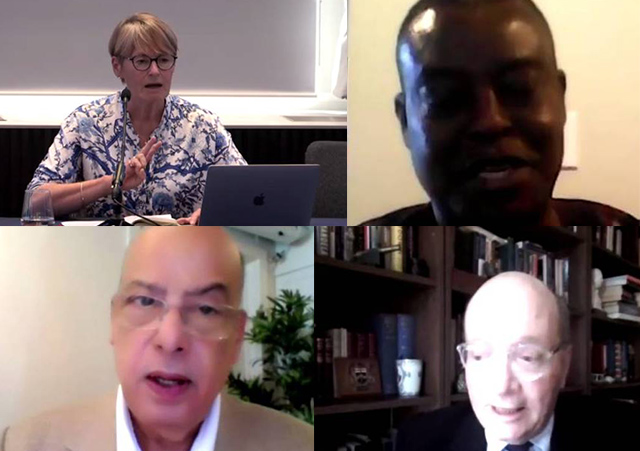 [Clockwise from top left] Sue Onslow in the chair. Via Zoom: Eghosa Osaghae, Hugh Segal and Ron Sanders.
[Clockwise from top left] Sue Onslow in the chair. Via Zoom: Eghosa Osaghae, Hugh Segal and Ron Sanders.
Although the main focus of a conference held by the Commonwealth Journalists Association (CJA) was to discuss the challenges facing journalism, a day-long series of discussions taking place between the Commonwealth Heads of Government Meeting (CHOGM) and the Commonwealth Games was bound to assess the state of today’s Commonwealth.
The 30 June conference assessed the politics of sports, the politics of reporting on violence, of education and of the media today. However, the panel discussion on ‘The Commonwealth, between the Kigali summit and the Birmingham Games’ focused on what session chair, the Institute of Commonwealth Studies Director Sue Onslow described as “politics and politics”.
Dr Onslow said that CHOGM only made the news if it became contentious. She pointed out how Commonwealth member countries had covered the Kigali summit in different ways – the UK/ Rwanda refugee asylum deal dominating coverage in the British press, while other countries focused on their leaders not attending or the challenge to the secretary-general.
What is the Commonwealth for?
Add to this agenda Prince Charles’s opening remarks on slavery, republicanism and the role of the head of the Commonwealth, the issues of tackling climate change and the Russian invasion of Ukraine, Dr Onslow said that the Commonwealth did get its day in the global media sun.
However, she pointed out that when she’d been approached for media interviews, the basic questions about the Commonwealth had been “what’s it’s for, is it relevant and what’s the future”.
She put these questions to the panel which consisted of the Director-General of the Nigerian Institute of International Affairs, Professor Eghosa Osaghae, Caribbean diplomat Sir Ronald Sanders, and the Director of the Canadian Defence and Foreign Affairs Institute, Hugh Segal.
“Reimagining” the Commonwealth
Prof Osaghae described the Commonwealth as an organisation “up for redefinition, reinvention and re-imagination”. He said that its colonial history had been the Commonwealth’s strength but, since the end of the fight against apartheid, the organisation had struggled to find other points of convergence.
He said that the Commonwealth could be emboldened by today’s big challenges to provide one of the voices people are now seeking. It was in a position to galvanise nations towards multilateralism and to move towards tackling difficult issues, while also bringing on board countries which had no British Empire past. He said that new Commonwealth members were looking for platforms to “solidify voices” and to “push” to become more active in global affairs.
Looking at what he called the “underbelly of Commonwealth cohesion” Prof Osaghae said that the network had endured through its active organisations such as the Association of Commonwealth Universities and events including the Commonwealth Games.
He argued for a Commonwealth future defined by sports and education and the needs of young people and women. “It is the time to bring together the fullness of the Commonwealth” as it “redefines itself” to address critical issues, he said.
Editorial: Glasgow, the Referendum and the Commonwealth Games by Stuart Mole, 2014
Britain, the G8 and the Commonwealth: Lessons of the Birmingham Summit by NIcholas Bayne
“State of drift”
Former member of the Eminent Persons Group (EPG) and a former contender for the secretary-general post, Sir Ronald Sanders said that the Commonwealth went into the Kigali summit weaker as an organisation than it had been for a decade. He talked of a “decline in confidence”, of critical reports on management within the secretariat and reduced funding for its administrative arm.
He warned of continued reduced funding leaving the secretariat “in a lame duck mode … and a state of drift” when the world needed international co-operation and direction. “The Commonwealth went to Kigali weak and rudderless … it has come out of Kigali even weaker and even more divided”, he said.
Sir Ronald spoke about the Commonwealth’s human rights values, enshrined in the Commonwealth Charter, and questioned its admission of new members at the summit. He said that the EPG’s 2011 ‘Time for urgent action’ report had highlighted issues which still plague the Commonwealth today with the EPG recommendations sidelined by leaders.
Hugh Segal, a former Canadian senator, EPG member and now an academic, said that the Commonwealth is different to other global organisations because it was “framed around values”. He added that “it has to stand for something. It can’t just stand for meeting on a regular basis because meeting on a regular basis is a fun thing to do”.
The Commonwealth ship adrift?
He said that values had to be essential and that countries had to “sign up” to a body’s values, as organisations such as the European Union and NATO insisted for new applicants. He argued for time to allow applicants to make progress towards an organisation’s standards. If this didn’t happen, he said that the “purpose of the organisation will be in question”.
Hugh Segal called on the CJA to hold governments to account, adding that the underlying values of democracy and human rights “cannot be set aside”.
To the question by the chair about whether the Commonwealth is capable of reform, Sir Ronald said that the power lies with Commonwealth leaders to move beyond their individual national interests and seek to be a force for good. Hugh Segal suggested that the Commonwealth ministerial action group should set a benchmark of principles for countries to meet by the next CHOGM.
Without action, Sir Ronald said that the Commonwealth had “lost its moorings” with “the ship … now adrift”.
Related articles:
Editorial: Glasgow, the Referendum and the Commonwealth Games by Stuart Mole, 2014
Britain, the G8 and the Commonwealth: Lessons of the Birmingham Summit by NIcholas Bayne
Excitement and Risk’ in the media of the future by Richard Bourne, CJA UK



